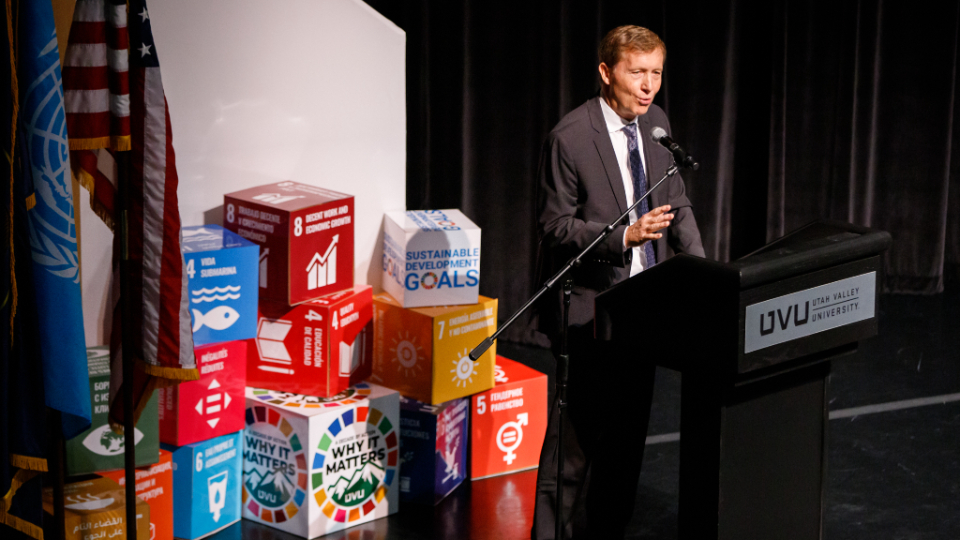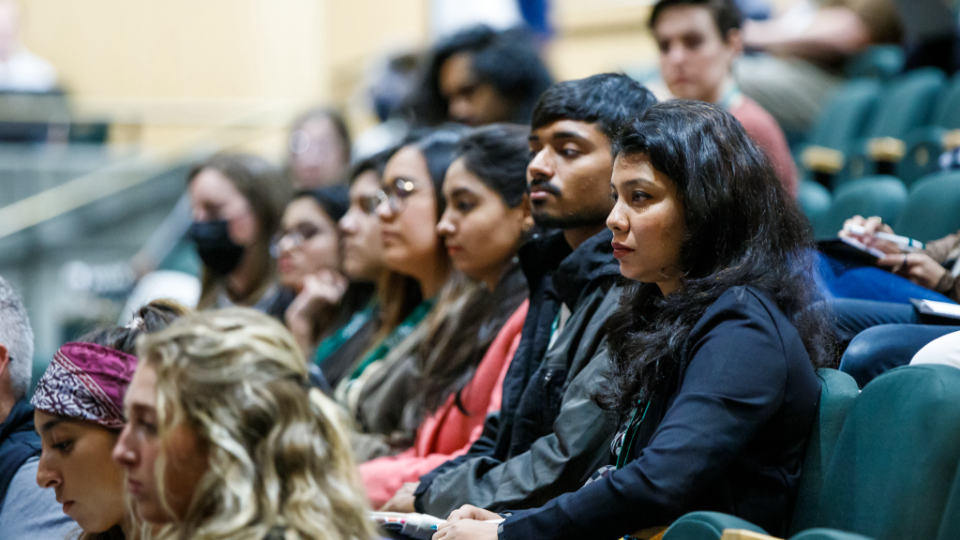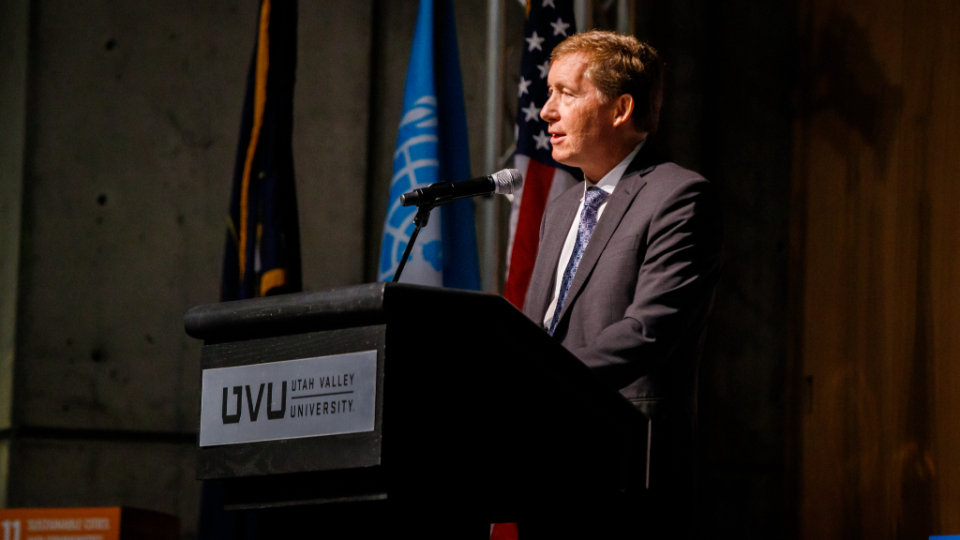For the second time in five days, a leader in The Church of Jesus Christ of Latter-day Saints gave an address on the importance of caring for the earth.
On Saturday evening, October 1, 2022, Presiding Bishop Gérald Caussé spoke in the Church’s general conference about environmental stewardship. And on Wednesday morning, October 5, 2022, Bishop L. Todd Budge, Second Counselor in the Presiding Bishopric, spoke on this topic in the opening session of Utah Valley University’s “Why It Matters” conference. The three-day conference is discussing 17 United Nations sustainable development goals designed to help people create a longer-lasting world.
Bishop Budge’s topic was “The Divine Gift of Creation: Our Sacred Duty to Care for the Earth.”
“When it comes to taking care of the earth, we cannot afford to think only of today,” Bishop Budge said. “The consequences of our actions, for better or worse, accumulate into the future and are sometimes felt only generations later. Stewardship requires feet and hands at work in the present with a gaze fixed on the future.”
In the video below, Bishop Budge’s remarks begin at 1:00:30
Bishop Budge highlighted six ways the Church of Jesus Christ is reducing its own environmental footprint.
Agricultural Land Management
The Church uses sustainable farming and ranching practices, such as cover crops, crop rotation, no-till farming, grazing management and other greenhouse gas capture methods, such as feed additives. The Church also encourages its membership to grow gardens. The faith’s Humanitarian Services helps families in urban and rural areas apply sustainable techniques for food production, nutrition, diet and home food storage.
Water Conservation
The Church of Jesus Christ employs best management practices for all new landscape designs and remodel projects of temples, meetinghouses, welfare facilities and educational buildings. At its headquarters in Salt Lake City, Utah, Bishop Budge said, the Church has reduced water consumption by more than 30 million gallons annually since 2018. The Church published a statement in June 2022 about the importance of water conservation.

IMG_0338.jpg
Bishop L. Todd Budge, Second Counselor in the Presiding Bishopric, speaks at the opening session of Utah Valley University’s “Why It Matters” conference on Wednesday, October 5, 2022, in Orem, Utah.2022 by Intellectual Reserve, Inc. All rights reserved.Energy Management
The faith has a long-standing practice of increasing energy efficiency. It is always seeking to improve its heating, ventilating and air conditioning systems and to use energy-efficient lighting. Bishop Budge said the Church’s Facilities Department has reduced its annual energy consumption by 17.8 gigawatt hours since 2018 — the equivalent of heating over 13 million households. The Church also has on-site solar projects on meetinghouses in various locations globally.
Waste Reduction
The Church strives to avoid material waste and to reduce, reuse and recycle. Bishop Budge said that in 2019, the faith’s Print and Distribution Center recycled 3,679 tons of paper, 303 tons of cardboard, 175 tons of plastic, 173 tons of metal and 55 gallons of used oil from machinery. The Church continues to evaluate opportunities to reduce its use of single-use plastics and in some instances exceed global and local regulations.

IMG_0202.jpg
Patrons gather at the Sorensen Student Center at Utah Valley University for the “Why It Matters” conference on Wednesday, October 5, 2022, in Orem, Utah.2022 by Intellectual Reserve, Inc. All rights reserved.Transportation
The Church seeks to improve air quality and transportation emissions. The Church is increasing fuel efficiency standards on its global fleet of vehicles, and it encourages employees to take public transportation, bike and walk where possible.
Sustainable Building Practices
The Church has increasingly prioritized the adaption of local building materials and methods to reduce emissions and transportation costs, support local economies and minimize disruption to the local environment by avoiding cutting down trees, erosion and laying excessive water lines. The Church also owns several LEED- and WELL-certified buildings.
“We have an obligation to be good stewards, to pass to future generations an earth better than we found it through the habits and values of wise stewardship,” Bishop Budge said. “We have the power within us to not only conserve and preserve but to be co-creators with God in beautifying and replenishing the earth. In doing so, we not only show our reverence and love for God, the Creator, but love for His greatest creation — each of us, humankind.”
Read Bishop Budge’s full address, titled “The Divine Gift of Creation: Our Sacred Duty to Care for the Earth.”

IMG_0360.jpg
Bishop L. Todd Budge, Second Counselor in the Presiding Bishopric, speaks at the opening session of Utah Valley University’s “Why It Matters” conference on Wednesday, October 5, 2022, in Orem, Utah.2022 by Intellectual Reserve, Inc. All rights reserved.Sister Kristin M. Yee Participates in Panel on Poverty
Sister Yee, Second Counselor in the Relief Society General Presidency, took part in the conference’s Thursday panel about ending poverty. She was joined by Javier Cortes Fernandez of UN Global Compact (Madrid, Spain) and Nandini Praveen of Maharajas Government Law College (India).
Sister Yee talked about the various programs the Church of Jesus Christ engages in to help alleviate poverty. These include self-reliance courses, employment services, EnglishConnect, Deseret Industries, Family Services, BYU–Pathway Worldwide and the everyday ministering that occurs at the congregational level. She shared numbers from the report on how the Church of Jesus Christ cared for God’s children in 2021. And, noting the indispensable nature of collaborating with other organizations to do good, Sister Yee mentioned the Church’s recent donation of US$32 million to the World Food Programme.
“As it says in Mosiah, we can do this together because our hearts are knit together in unity and love towards one another,” Sister Yee said. “It begins with you and [me]. It begins with peace in our hearts. It begins with the love of God in our hearts to work together, to see each other for how God sees us.”
The cause to end poverty worldwide “is tremendous,” Sister Yee said. In addition to helping people far away from us, she urged people to remember their next-door neighbors.
“There’s a purpose for your placement, so look around you,” she said. “Where can you contribute? Where can you love? Where can you serve? Because He’s placed you there for a reason, and you have a mission and a purpose there. And He loves you.”
Sister Sharon Eubank Speaks in Panel on Partnership
Sister Eubank, director of the Church’s Humanitarian Services, was part of a Friday afternoon panel about UN sustainable development goal 17, which focuses on the importance of global collaboration in doing good.
“Relationships have to precede any kind of action,” Sister Eubank said. “We can’t go forward until we trust the people we’re working with and we have some kind of experience with each other.”
Sister Eubank pointed to the Church of Jesus Christ’s collaboration with the Black 14 Philanthropy as one example of how the faith is collaborating with others to feed the hungry across the United States. She noted the Church’s work with the World Food Programme and UNICEF to feed the hungry globally. And she urged people to use JustServe to find service opportunities in their communities.
“One of the things that we are promoting is volunteerism — that we do things that we don’t get paid for because it’s for the good of society,” Sister Eubank said. “And in that way, it kind of knits us together from these isolated boxes that we live in.”
Other members of the panel were Eider Inunciaga Serna of BBK Kuna and Baldomero Lago, chief international officer of UVU and Jayashri Wyatt, chief of education outreach at the United Nations.